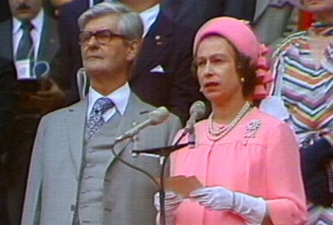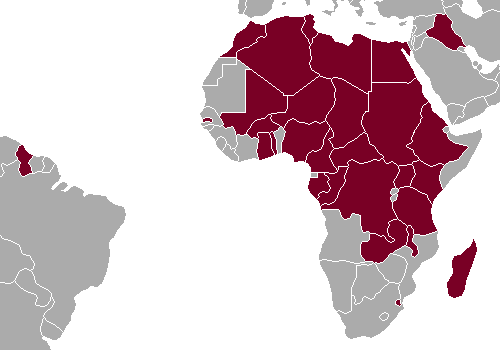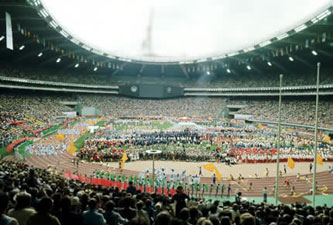A brief history of Olympic dissent: Montreal 1976
With the Olympic Games being held in the People's Republic of China, there has been plenty of attention focussed on the Chinese record on human rights, the environment, and particularly the relationships between China and Tibet and Taiwan.
Earlier this year the Olympic Torch Relay became a focus for political protest, and I've been writing a series of posts looking at the history of Olympic dissent. In the previous post in this series I looked at the lowest point of the Games existence, the terrorist attack on Israeli athletes at the 1972 Munich Games. As this followed the massacre that had occurred before Mexico held the Games in 1968, being a host city was beginning to look like a poisoned chalice - one which Montreal had the dubious honour of holding in 1976.

The Big "Owe"
The Montreal Games are generally best remembered as the Games that put a city into debt. The cost of the stadium was not fully paid-up until 2006, and the building didn't even get finished in time for the Games. In fact, it wasn't until the late eighties that the roof was added at all, and the impressive design completed.

There were also some quirks due to the competitors involved. Great British Equestrian entrant Princess Anne was able to forego taking a 'sex test' to prove she was eligible to compete as a woman. I'm not sure whether that was because her sex was made abundantly clear by her position in the British Monarchy's legal line of succession, or whether it was simply done out of decorum. Perhaps, since her mum had officiated at the Opening Ceremony, it was considered a little rude to ask?

The first big boycott
On the political dissent front, it was the 1976 Games that saw the first organised widespread boycott. A few countries had refused to take part in previous games, often over bilateral national issues, and some countries had withdrawn from the 1972 Games after the terrorist attack, but 1976 was the first use of the boycott en masse as a political tool.
28 mostly African countries refused to take part: Algeria, Cameroon, The Central African Republic, Chad, Congo, Egypt, Ethiopia, Gabon, Gambia, Ghana, Guyana, Iraq, Kenya, Libya, Madagascar, Malawi, Mali, Morocco, Niger, Nigeria, Sudan, Swaziland, Tanzania, Togo, Tunisia, Uganda, Upper Volta and Zambia.

Those missing the games included athletic world record holders Filbert Bayi from Tanzania and John Akii-Bua of Uganda. Between them, the 28 nations had won 21 medals at the previous 2 Olympics, including 6 golds.
The target of their boycott was ultimately apartheid-era South Africa, but in this instance New Zealand were the proxy. The All Blacks were continuing to tour South Africa to play rugby in defiance of a general ban on sporting contact, which included South Africa's exclusion from the Olympic movement. The African nations leading the boycott wanted New Zealand excluded.
The IOC argument was that the actions of New Zealand's rugby administrators were beyond their control, that other countries had also visited South Africa to maintain sporting links, and that in banning both South Africa and Southern Rhodesia they had done all they could to sever sporting ties. Whilst they had a point, it was also nevertheless the case that Ces Blazey was both chairman of the New Zealand Rugby Football Union and chairman of the New Zealand Amateur Athletics Association.
The research gap
Trying to research the 1976 boycott of the Olympic Games inevitably exposes some of the cultural bias that seems to be inherent on the web. If I want to find out about the race issues affecting American athletes in the sixties, which led to the iconographic images from the 1968 Mexico Olympics, there is a wealth of material. If I want to find out about the Cold War inspired 1980 and 1984 Olympic boycotts, then again, I can turn to many different reference sources and reading materials.
However, information on the 1976 African-led anti-apartheid boycott of the Montreal Games is thin on the ground. The number of countries that did not take part exceeded those who refused to attend in 1984, and in many ways the boycott was more dramatic. Unlike in 1980 and 1984, when the decision was made and publicised months in advance, in 1976 the countries mostly walked out of the games after they had started, having accepted invitations to attend.

"Just perfick"
On the positive side, the 1976 Olympics were not all about the boycott and debt.

They also saw the sensational arrival of Nadia Comăneci on the world stage. She produced a gymnastic display so perfect that, in video game parlance, she "clocked" the digital scoreboard. It wasn't capable of displaying her score.
Next...
The next Olympic Games were destined to be one of the most political in history, as the US led a boycott of the 1980 Moscow hosted games, in protest at the Soviet Union's military involvement in Afghanistan.